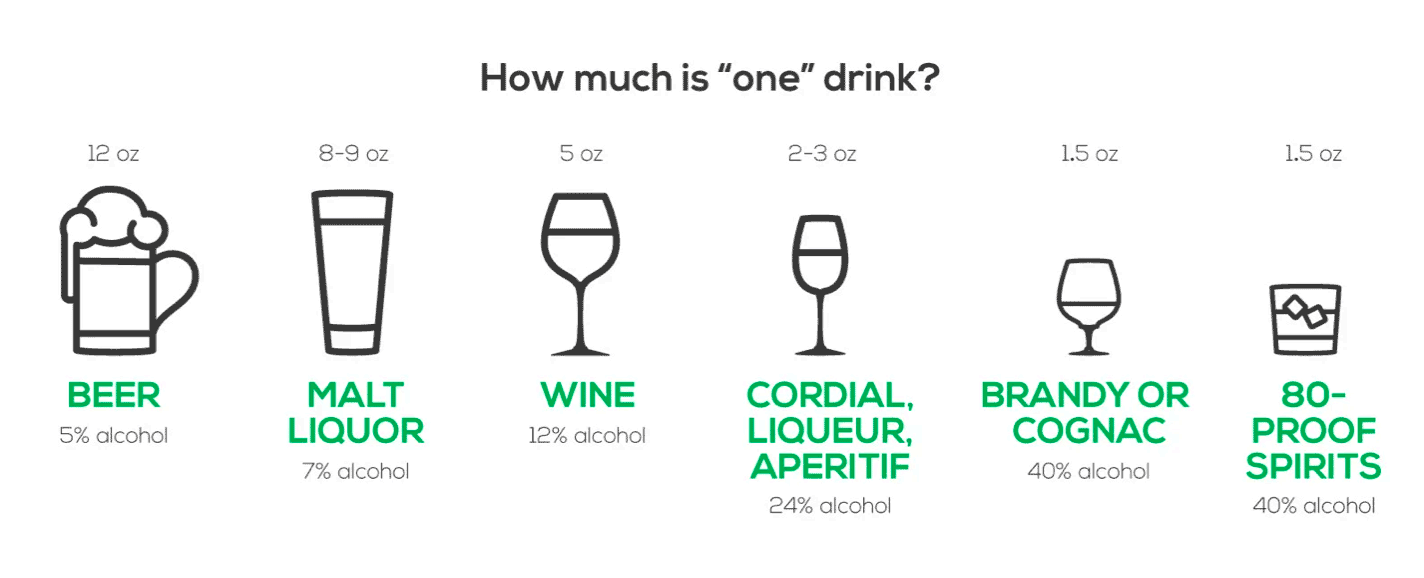
FAQs About Alcohol Consumption
A standard drink contains about .6 fluid ounces, or 14 grams, of pure alcohol. Each of the drinks pictured here contain approximately the same amount of alcohol and are considered to be a “standard drink.”

The current Dietary Guidelines for Americans recommend that women don’t exceed one drink per day while men don’t exceed two drinks per day. The guidelines also state that the following individuals should never drink alcohol:
- Children and adolescents
- Individuals of any age who cannot limit their drinking to low levels
- Women who are pregnant or may become pregnant
- Individuals who plan to drive, operate machinery or take part in other activities that require attention, skill, or coordination
- Individuals taking prescription or over-the-counter medications that can interact with alcohol
- Individuals with certain medical conditions
- Individuals recovering from alcoholism
Alcoholism, or alcohol dependence, is now referred to as “Alcohol Use Disorder.” It is defined as the use of heavy doses of alcohol with resulting repeated and significant distress or impaired functioning. While most drinkers sometimes consume enough alcohol to feel intoxicated, only a minority (less than 20 percent) ever develop Alcohol Use Disorder defined by the following criteria:
- A strong need or craving for alcohol
- The inability to cut down or control alcohol use
- Larger amounts over a longer period than was intended
- A great deal of time is spent in obtaining, using and recovering from alcohol.
- Continued drinking despite having persistent or recurrent social or interpersonal problems caused
- Important social, occupational, or recreational activities are given up or reduced because of alcohol
- Recurrent alcohol use in situations in which it is physically hazardous
Withdrawal
Certain people should avoid alcohol completely, including those who:
- Plan to drive a vehicle or operate machinery
- Take medications that interact with alcohol
- Have a medical condition that alcohol can aggravate
- Are pregnant or trying to become pregnant
Helping a Loved One
There are ten common signs that alcohol might be a problem for someone:
- They are lying about drinking or hiding alcohol
- They have intense mood swings based on drinking patterns
- They have developed health problems related to excessive alcohol intake
- They have developed problems at work or school, such as showing up late or poor performance
- They are dealing with legal issues due to behavior while drinking
- They drive while intoxicated
- They are having problems managing tasks at home
- They are isolating themselves from family members or friends
- They regularly promise to cut back or quit drinking
- They are unable to quit drinking for any period of time, no matter the consequences
Watching someone struggle with an alcohol problem can be isolating and can make you feel helpless. Take our screening tool to help you better understand the effects that alcohol may be having on your loved one. If you are interested in talking to us about your loved one, call us at 907-249-6647. We are ready to help. For 24/7 support, please call the Careline at 977-266-4357.
- Online Al-Anon resource: https://al-anon.org/al-anon-meetings/electronic-meetings/
- Local Al-Anon: https://al-anon.org/al-anon-meetings/find-an-al-anon-meeting/
- Alateen Resource: https://al-anon.org/newcomers/teen-corner-alateen/
- Celebrate Recovery (Anchorage): https://www.mcaonline.org/celebrate-recovery
